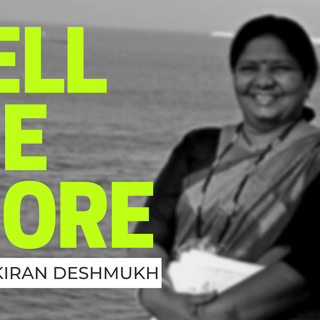
Pass It On: A Resume Gap Doesn’t Matter If You Can Explain It With Confidence
“If you have an unusual CV, part of owning the story is demonstrating the confidence to show your vulnerability.”

In Pass It On, two seasoned entrepreneurs help women navigate modern-day career conundrums. In this installment, we ask — does a resume gap really hurt your chances during a recruitment process?
Resume gaps have evolved from being an obvious no-no in traditional work environments to modern workplaces developing a more flexible approach toward job applicants’ work histories. Here, we sit down with The Swaddle’s founder Karla Bookman, and investor/strategist Rupa Pandit, to find out how they’ve perceived gaps in a person’s resume and career trajectory from their perspectives as both employees and employers in various industries.
*
Rajvi: So glad to have you both here. Starting off, can you tell me what kind of associations did you have with the concept of resume gaps in your careers, both early on and now?
Karla: I never had a single gap in my resume for the first 12 years of my career. Even going back into summer internships and jobs and law school, I never let a single month be unaccounted for. And I think that speaks to how much traditional wisdom on CVs two decades ago was that you just couldn’t have a resume gap, that it was unacceptable. What’s exciting is that people’s thinking has evolved.
I’ll give an example of when a resume gap really helped an applicant I was evaluating. This is when I worked in a law firm in New York, and I was interviewing junior lawyers to join right out of law school. I got this CV from somebody who had taken two years off after law school and now was applying for an entry-level position. I asked him for an explanation for what he was doing for two years, and he said his mother was dying of cancer, other members of the family couldn’t stop working for various reasons, and he was the only one who could be there to take care of her, and he did until she died. And the way he told that story, he shot straight to the top of my list. He was the number one person I recommended. This person had gravitas, he was sincere, he was mature, he took his responsibilities seriously. I thought he would be a great employee. I had absolutely no issue with his two-year hiatus.
Rupa: Yeah, I think the biggest piece of feedback I got and that I also modeled for myself is to present my history as a story. Whatever role I’m there for, I’m there because of a full mix of what I’ve done and what I’ve learned from it and about myself. That helps me address what chronologically might not be in order, or what might seem like a gap, or the most direct path or fit for that role. It’s to say, “These are my takeaways or what I’ve learned from the previous experiences I’ve had. This is why I’m here in front of you today because all of these are what make me a good fit.”
Rajvi: As women, do you think explaining the resume gap is more challenging to do, and are there perhaps more gaps to explain?
Karla: Yes, obviously, Because there’s so much bias against women in virtually every industry, that you’re starting on the back foot. In most industries, in most workplaces, unfortunately, there are patriarchal biases that enter virtually every room that is mostly male-dominated. And how women spend their time, and the burdens they might have at home — it creates the impression that they’re somehow less serious professionals. I do think women struggle to explain these gaps. Especially when a woman has taken multiple years off for childcare, there’s this assumption that she has fallen off a professional track. When it gets to multiple years, it gets really difficult, and that’s where some sort of continuing professional development and training in the background becomes really important, to be able to assert to people that you haven’t completely lost track of what’s happening in your industry.
Related on The Swaddle:
Rajvi: So, childcare, for example, can be a full-time job. So if you need to get back into the game, it’s hard to know what happened over the span of a few years, right? So, what does an employer do when these skills can atrophy? What is the answer there?
Rupa: Skills atrophying, to me, is being in touch with the day-to-day in any job. But somebody’s drive and ability to execute are not things that go away when their focus has been on caregiving and not a job in an office. So you can focus on other aspects, and get back when you’re ready to focus on your career. It’s important going into the interview to demonstrate the work you’ve done to prep for the interview, to show you know the work that’s been happening in the industry. You don’t have to show you know everything that’s been happening for the past two years in that industry. It’s simply not necessary.
Rajvi: What about other scenarios? For example, these listicles of how to appear in a job interview often denounce needing downtime as a big no-no. As you said Rupa, the resume gap always needs to be explained constructively somehow. So, can downtime just be downtime, or does it need some sort of spin?
Rupa: I would say it’s all about how you present it. I’ve seen two ways in which people fail to explain something like this. One is a long explanation that seems like they’re apologetic, that ends in silence or mumbling, that comes off as a not-put-together thought around what their takeaway or conclusion is for that period of time. The other thing I see is some unbelievable conclusion about the lives they saved or long strides they’ve made in that period of time. Those two things are always red flags like you’re doing too much, pushing too hard to explain that period. There could be reasons that are health-related — both physical and mental health — that can explain why somebody needed time away. The takeaway is you want people to, if they can, always be focused on development. You want people to be able to contribute to society, but sometimes that’s not possible. When that’s not possible, a short and honest explanation is best. What I personally care about is that time period’s over, they’ve come out of it. I don’t have a concern about the why so much. If there’s confidence in their answer, and freedom from these long explanations, that works much better when I’m on the other side of the table.
Karla: I agree. The most salient piece is confidence in their narrative. I get uncomfortable about somebody who feels like they’re not owning their own story because it feels like they’re being cagey and not honest with you. If you can articulate with conviction that you’re ready for what the next professional chapter is, it convinces whoever is listening that this so-called gap is not really a problem.
The other thing I’ll say is when there’s a relatively senior person who is interviewing or evaluating this resume, don’t forget they’re a person who has likely experienced some of these things. They know and understand that there may be health issues, or an intersection of all kinds of crazy stuff that goes on in your life, that forces you out of the paid workforce for a few years. So the assumption that an employer won’t get it, or they will judge you for it, it’s wrong.
Rupa: To me, this goes back to the apprehension to demonstrate vulnerability. It’s absolutely okay to do that, and it’s important to do that. If you have an unusual background or an unusual CV, part of owning the story is demonstrating the confidence to show your vulnerability. To be able to say, “Here was a situation, and I dealt with it, and now I’m through it.” The more that the person who is trying to secure a new job can demonstrate that comfort in their own skin, that they are who they are, they are their history, including the vulnerable parts, that’s very powerful. It’s not about demonstrating that everything is 100% all the time, because nobody is that, nobody needs that. There’s a lot more strength in showing that you can talk about your vulnerability in a way that is analytical, and then say here’s how I can still contribute. And honesty is much more confident.
Related on The Swaddle:
It’s Time For a More Humane Approach to Mental Health Care
Karla: And it also is changing dramatically. That’s why it’s important to look for women-led teams or female mentors — you always want to make sure there’s someone in the organization, if possible, who really has lived some of these pressures and may be able to understand them a little more deeply.
Rajvi: So, you’ve mentioned how we’re moving away from a very traditional to a kind of flexible and understanding work environment. Do you see any catalyst for that shift?
Rupa: Here’s one thing that changes, jumping off of what Karla said when she met the junior lawyer who had taken a gap. When you have enough experiences of people who think there’s a basic formula that leads to the best performance, is not actually what leads to the best performance, and that it takes different experiences — when those people become hiring managers, and they have influence, you can start to see the hiring filters change. The filters changing is the catalyst we need. We don’t need these cookie-cutter replicas.
Karla: Yeah, it seems so obvious — it’s different people being in charge. It’s not the old white man anymore. The more diversity of life experience you have at the top, making organizational choices, and deciding who can do what needs to be done, the more scope and variety you have in terms of who can fulfill those roles, and what they bring to the table. It’s not a checklist anymore. The people in charge, who make the decisions, are slowly changing.
Rajvi: And what about the idea that work needs to be constant in one’s life, and that the gap is aberrant, and work is the norm — do you think that’s an idea that needs reshaping?
Karla: I think we now know that work means many different things. Work is not only a paid professional job in a tall office building in a major metropolis. Work can take all sorts of different forms, some of it is paid, some of it is unpaid. I think our notion of work is expanding. I mean, the unfortunate reality of adult life is that you need to work a majority of the time, but whether you have to be constantly engaged in a paid, professional, salaried job, I think is a different question and people’s thoughts on that are evolving.
Rupa: I agree with that. Yes, people need to be self-sustaining, and feel like they’re building something, or contributing in a way. But work can encompass all of that in different ways for different people. We need to move away from a set metric of what constitutes work.
Related


The Buzz Cut: Why Public Stories of Miscarriage Matter So Much
